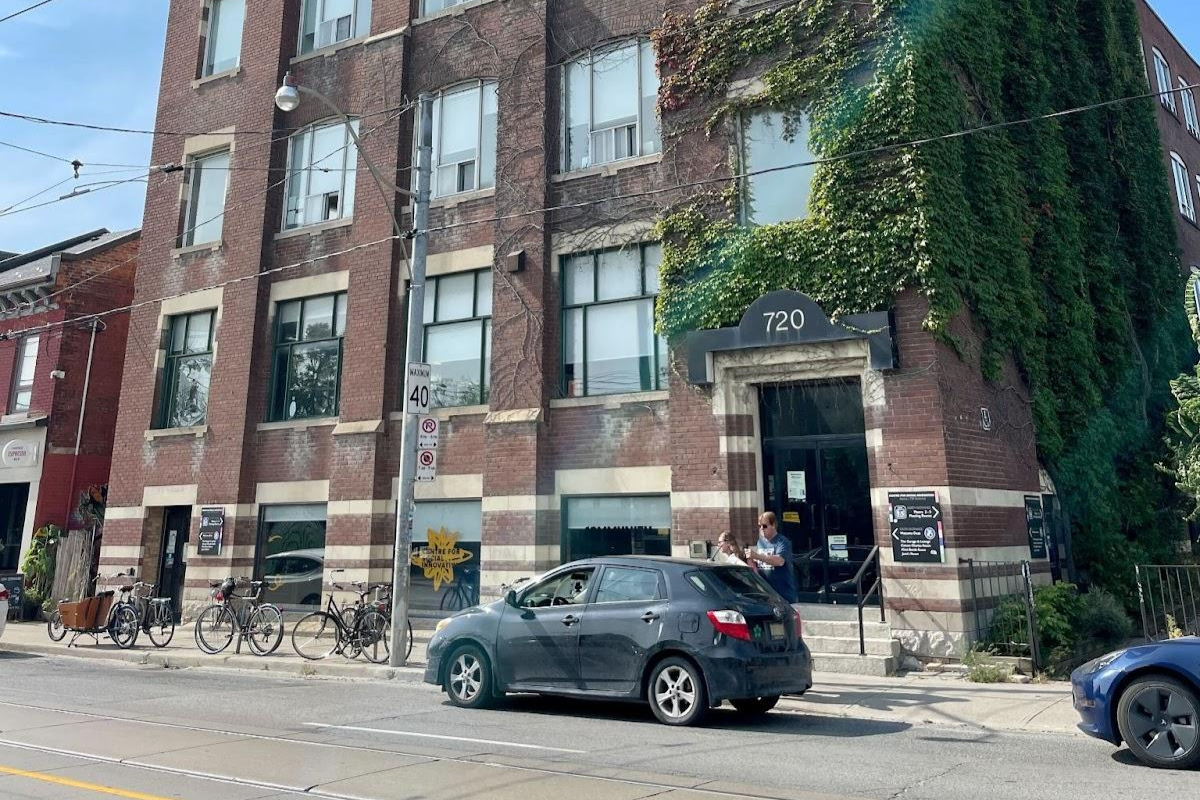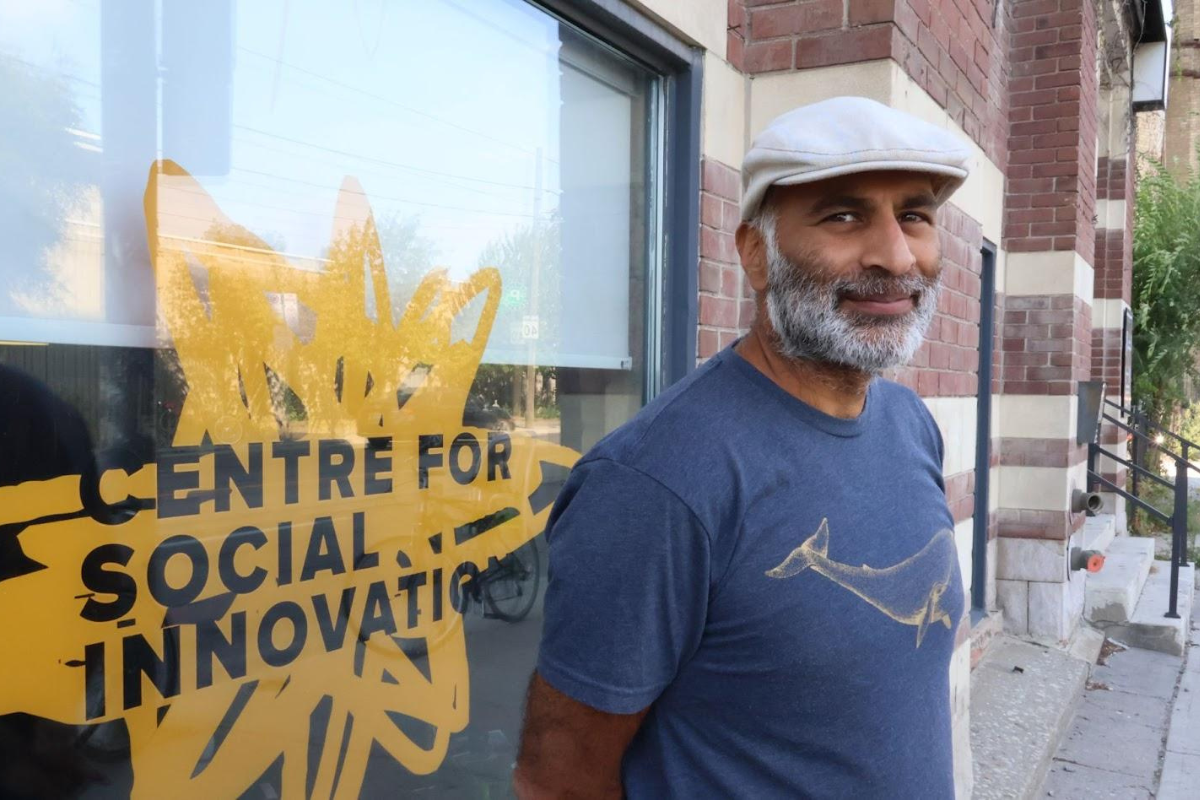Toronto’s Centre for Social Innovation to sell Annex coworking space; cites rising interest rates, downturn in coworking revenue
Why It Matters
Rising interest rates are making it more difficult for non-profit landlords to hang on to existing properties or create new ones, reducing the availability of commercial space for charities, non-profits and social entrepreneurs.

The Centre for Social Innovation, one of Toronto’s best-known non-profit landlords, will sell its 36,000 sq. ft. coworking space in the Annex neighbourhood in the next 12 months.
While the non-profit hopes to sell to a socially-minded buyer, the organization’s CEO Tonya Surman said the building’s 275-odd existing tenants will likely be forced to find a new workspace — at the non-profit’s other coworking site or elsewhere — and the community stands to lose a prominent event space.
Surman said they hope to fetch more than $20 million for the 720 Bathurst St. property, allowing the organization to pay off its mortgage with Vancity Community Investment Bank and to maintain its other coworking space, a 64,000 sq. ft. property on Spadina Avenue near Toronto’s Chinatown.
“By selling the one, we ensure the future of the other,” she said.
The sale announcement comes after Artscape, one of the city’s best-known social purpose landlords, recently announced it will enter receivership in October, having failed to find a buyer for Daniels Launchpad, an arts-focused coworking space on Toronto’s waterfront.
The Centre for Social Innovation’s Annex property is the third coworking space the organization has been forced to shutter in as many years. In 2020, sites in New York City and Toronto’s east-end Regent Park neighbourhood were closed due to dramatic revenue losses resulting from pandemic lockdowns.
The principal driver for the decision to sell the Annex property is because coworking revenues have not rebounded sufficiently since the pandemic, said Seana Irvine, CSI’s board chair.
While membership numbers have risen to near pre-pandemic levels, workers are opting for memberships that offer more work-from-home flexibility rather than more pricey dedicated or private desks, she said.
“The bottom line is that COVID has just changed the nature of the business…Long-term, it gets harder and harder to sustain — or to justify — having two buildings.”
Rising interest rates have also contributed to the decision to sell.
CSI’s mortgage is up for renewal next year, when Irvine expects their interest rate to more than double — from 3.4 per cent to 6 per cent — resulting in an additional $425,000 in annual costs by 2025.
While some landlords may be able to pass these costs onto commercial tenants, CSI’s mission demands they try to keep their spaces affordable, Irvine said.
“We’re trying to read the tea leaves here and act proactively in a way that guarantees the long-term sustainability of the mission of the organization — even if it means a very difficult business decision,” she said.
Dihan Chandra, a social entrepreneur who has been a CSI member for about a decade, said the sale of the Bathurst St. coworking space will be a “huge loss” for the community.
While Chandra plans to remain a CSI member, shifting his office to the organization’s other property, he said he’ll likely work there less often because it’s a longer commute.
The sale will also be felt in the changes to members’ routines and neighbourhood ties.
Working in the Annex for a decade, the staff at a local coffee shop know Chandra’s name and order. The founder of Spent Goods, a social enterprise that reduces food waste, also anticipates some CSI members may not switch to the Spadina Ave. location, fracturing coworker connections.
Still, as a business owner, Chandra said he understands the decision made by CSI’s board to consolidate their finances to shore up the organization’s remaining site.
“The saving grace for me is there is another location. I think I would have been a lot more distraught if there wasn’t,” he said.

CSI keen to sell building to social purpose developer
Surman said her organization is not taking the typical approach to sell the property, likely bucking traditional real estate advice to dispose of the asset in a mission-aligned way.
Contractually, CSI is only obliged to give members between 30-90 days’ notice before ending their leases, and most sellers opt to select a buyer based on the highest bid alone, she said.
Instead, CSI is giving members 12 to 18 months’ notice before they will likely be forced to relocate, she said. The non-profit has also chosen to go public with news of the sale about six months before they begin accepting offers to give socially motivated buyers a chance to prepare their bids.
Community bondholders will have options
In addition to members, the news came as a surprise to CSI’s 180-odd community bondholders, who have loaned the organization about $4.7 million.
The Centre for Social Innovation pioneered the creation of community bonds in 2010 when they used community capital to fund the purchase of the Annex coworking space. Rather than looking exclusively to banks for cash, the organization turned to members, offering modest interest in exchange for debt.
When the Annex property sells, community bondholders will have the option to be paid out or renew their bond, secured against the Spadina Ave. property, said Surman.
The sale will have a “neutral” impact on community bondholders, which lends credence to the hypothesis that community bonds are a good bet for socially-minded investors, said Eric Meerkamper, CSI’s bond trustee.
“The good thing right now is that the bondholders are very well covered by the value of the buildings,” he said.
The fact that CSI owns the Annex coworking space also helps demonstrate the value to charitable organizations of leveraging community bonds to purchase property rather than rent, he said.
In New York City and Toronto’s Regent Park, CSI leased coworking space from commercial landlords. When the pandemic hit and memberships dried up, they saw they wouldn’t be able to make rent and closed the spaces, reaping no benefit from the increased property values that occurred while they were tenants, Irvine said.
Not so with the Annex property. Community bonds helped CSI buy the property, increasing the organization’s long-term financial resilience, Meerkamper said.
Still, the building sale is not what the non-profit wanted, and Irvine said the Bank of Canada’s interest rate policy choices contributed to the decision.
“I do sometimes scratch my head when I think: These metrics the Bank is following to get inflation under control…there’s tremendous, real suffering it causes people. There does seem to be a real disconnect between policy and experience,” she said.
The road ahead
In addition to doing right by bondholders, Surman said her team is also aiming to reduce the negative impacts of the sale on tenants.
All existing programming, including workshops and events, will be shifted to the organization’s Spadina Avenue location, and there will be room for as many Annex members as would like to rent space there, too, she said.
“I’m sad, personally. I’m really sad because that building holds so many memories…[But] the building is not CSI. The community is CSI — the people, the connections, the work, the love and the values.”
